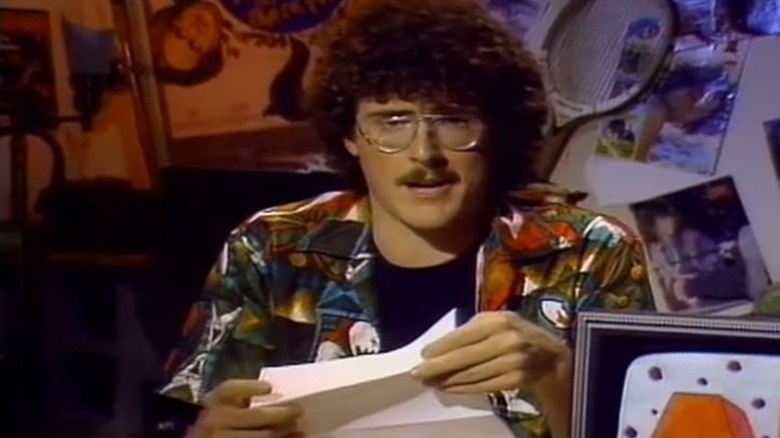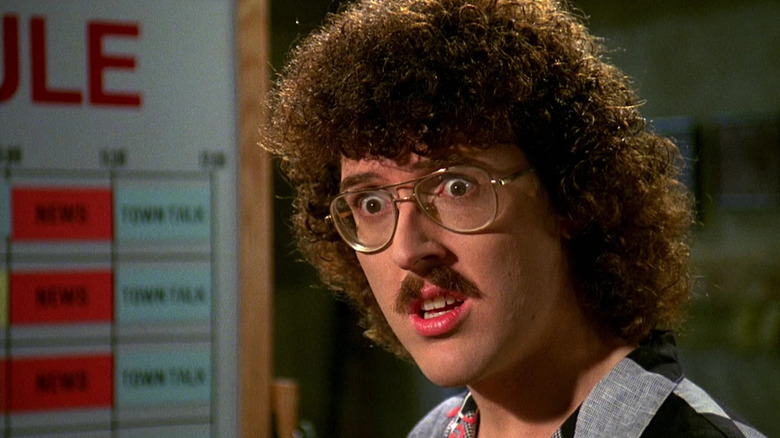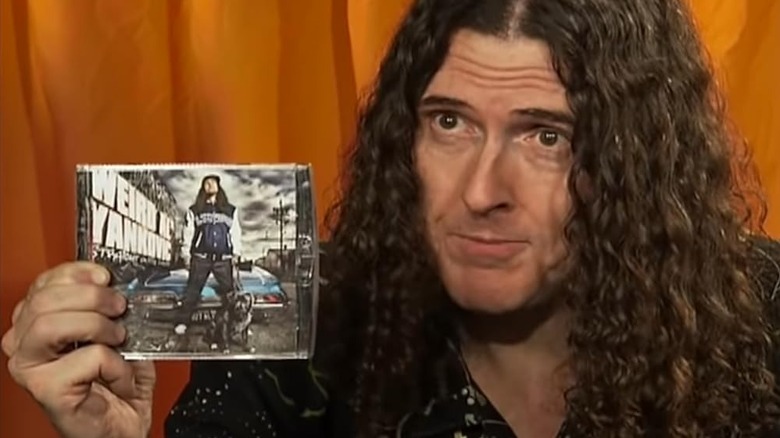'Weird Al' Yankovic's Strange And Brilliant Video Series That Helped Prop Up MTV
When MTV debuted on August 1, 1981, it ironically started with the music video for the Buggles' hit "Video Killed the Radio Star." MTV knew it wasn't killing radio, but if its opening salvo was to address the changing state of pop media, along with its move from radio to television, then it at least knew what function MTV was going to serve moving forward. Those early years of the network were a Wild West of experimentation, with punk bands, New Wave bands, and bizarre novelty acts rushing to fill the suddenly open landscape of 24-hour-a-day music programming. And it seemed that, at the time, MTV would take anything. It had a lot of airtime to fill, and not every band was yet on board the music video wagon.
The first hour of MTV was rounded out by Pat Benatar's "You Better Run," Rod Stewart's "She Won't Dance With Me," The Who's "You Better Bet," Ph.D.'s "Little Suzi's On the Up," Cliff Richard's "We Don't Talk Anymore," and The Pretenders' "Brass in Pocket." The first day of programming was also meant to include shorts and news segments, but the scrappy new network wasn't quite professional yet. That meant there were many spots of dead air.
The door, however, was now open, and a new medium began to break out. Some bands took to the music video format immediately, using their songs as a springboard for fascinating short filmmaking. MTV loved Devo (headed by future "Thor: Ragnarok" composer Mark Mothersbaugh) for this reason. The channel was also eager to throw on whatever striking, weird comedy acts it could, and their early years were bolstered by the immensely popular music video parodies of one "Weird Al" Yankovic. Not only were Yankovic's songs funny, but his videos also made direct satirical reference to the artists' he was parodying.
Indeed, Al's songs had become so popular by 1984 that MTV invited him (on April Fool's Day) to host a four-hour comedy music video showcase program called "Al TV." The show expanded MTV's repertoire immensely.
Al TV revealed how weird MTV was willing to get
"Weird Al" Yankovic didn't release his first self-titled album until 1983, but he had been a rising star in the comedy music world thanks to demos and live performances played on "The Dr. Demento Show" in Los Angeles. It's work remembering that Yankovic, while a comedian, was tapping into a playful punk sensibility with his song parodies, suggesting that pop media in general is not something worth taking seriously. He wasn't just using Queen's melodies to make whimsical observations about riding on public transport, he was saying that pop melodies are pliable, almost meaningless, and easily transformed into something frivolous.
With the debut of MTV coming at the same time as Yankovic's rise, the brand-new medium was already ripe for satire. He was invited to host "Al TV," and he took to TV well. The premise of the series was that Al himself had taken over the MTV airwaves using rudimentary appliances in his living room and was going to run the station however he wanted. The "Al TV" segments were comedy bits and Yankovic's humorous sketches, punctuated by music videos that the musician got to curate himself. Because Yankovic had such eclectic taste in music, as well as a deep knowledge of the history of comedy, he would program a lot of very, very odd things. For instance, he would showcase Bill Paxton's music video for Barnes & Barnes' "Fish Heads" (which Paxton helmed years before his underrated feature directorial debut "Frailty") or "Dog Police" by, well, Dog Police. Sometimes, the exhibited videos weren't for comedy songs, but they were a little offbeat, like Wall of Voodoo's "Mexican Radio."
Yankovic also played certain popular mainstream music videos, sometimes uninterrupted but often with running commentary. The show's host, however, revealed just how deep MTV's music video library really was through some of his absurd choices. Yankovic didn't care about appealing to a wide audience, as he knew that the entire network was, in 1984, running on novelty. Instead, "Al TV" opened the world up to the strange.
Al returned to do Al TV specials through 2006
Another fun detail of "Al TV" were Yankovic's fake interviews. He would find B-roll of famous musicians giving interviews and cut himself into the interview, asking absurd questions. Yankovic liked the interviews so much that he later played them during concerts.
There have, to date, been 10 "Al TV" specials. There were two in 1984 followed by additional episodes in '85, '87, '88, '92, '96, '99, '03, and '06. They all coincided with Yankovic having a new album coming out, giving him a chance to debut his own videos and hype any tours he was about to go on. By the 1990s, however, the MTV format was codified, musical trends had changed, and "Al TV," while sharper and funnier than ever, didn't have the same scrappy "pioneering" effect as in 1984 and 1985. By the 1990s, "Al TV" was an anticipated event (unlike his 1989 film "UHF," which tanked horribly).
But for a spell, it appeared that "Al TV" fulfilled a more fascinating media function. Yankovic was a vital part of those early MTV year, showing that music videos were okay to be satirized and that comedy was an essential part of the musical landscape. Indeed, Al's punk humor was vital for establishing that MTV was a force unto itself, establishing that deconstruction was the network's lifeblood. MTV may have been killing the radio star, but "Weird Al" gave them an arsenal of weapons to do so.
As of this writing, Yankovic has more or less retired from cutting new albums. His last record, "Mandatory Fun," was released in 2014, and he has only recorded a few singles since then. Also, the state of MTV changed dramatically in the 2000s, focusing less on music and more on reality shows. As such, neither "Mandatory Fun" nor his record prior to that, "Alpocalypse," had "Al TV" specials. The time for them had passed.


